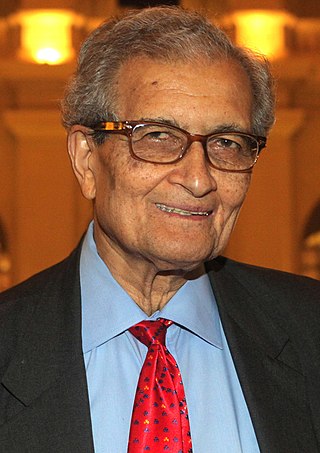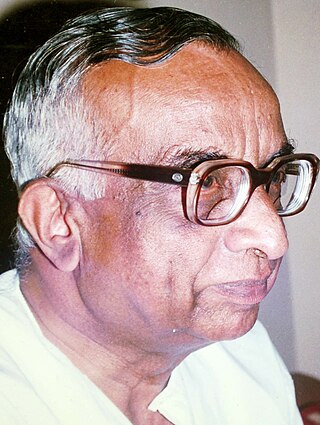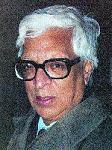
Jawaharlal Nehru was an Indian anti-colonial nationalist, secular humanist, social democrat, statesman and author who was a central figure in India during the middle of the 20th century. Nehru was a principal leader of the Indian nationalist movement in the 1930s and 1940s. Upon India's independence in 1947, he became the first Prime Minister of India, serving for 16 years. Nehru promoted parliamentary democracy, secularism, and science and technology during the 1950s, powerfully influencing India's arc as a modern nation. In international affairs, he successfully maintained India's neutrality throughout the Cold War. A well-regarded author, his books written in prison, such as Letters from a Father to His Daughter (1929), Glimpses of World History (1934), An Autobiography (1936), and The Discovery of India (1946), have been read around the world. The honorific Pandit has been commonly applied before his name.

Amartya Kumar Sen is an Indian economist and philosopher, who since 1972 has taught and worked in the United Kingdom and the United States. Sen has made contributions to welfare economics, social choice theory, economic and social justice, economic theories of famines, decision theory, development economics, public health, and measures of well-being of countries.

Narendra Damodardas Modi is an Indian politician serving as the 14th and current prime minister of India since May 2014. Modi was the chief minister of Gujarat from 2001 to 2014 and is the Member of Parliament from Varanasi. He is a member of the Bharatiya Janata Party (BJP) and of the Rashtriya Swayamsevak Sangh (RSS), a right-wing Hindu nationalist paramilitary volunteer organisation. He is the longest serving prime minister from outside the Indian National Congress.

Manmohan Singh is an Indian politician, economist, academician and bureaucrat who served as the 13th Prime Minister of India from 2004 to 2014. He is the third longest-serving prime minister after Jawaharlal Nehru and Indira Gandhi. A member of the INC, Singh was the first Sikh prime minister of India. He was also the first prime minister since Jawaharlal Nehru to be re-elected after completing a full five-year term.

Delhi University (DU), formally the University of Delhi, is a public central university located in Delhi, India. It was founded in 1922 by an Act of the Central Legislative Assembly and is recognized as an Institute of Eminence (IoE) by the University Grants Commission (UGC). As a collegiate university, its main functions are divided between the academic departments of the university and constituent colleges. Consisting of three colleges, two faculties, and 750 students at its founding, the University of Delhi has since become India's largest institution of higher learning and among the largest in the world. The university has 16 faculties and 86 departments distributed across its North and South campuses, and remaining colleges across the region. It has 91 constituent colleges. The Vice President of India serves as the university chancellor.

Jawaharlal Nehru University (JNU) is a public major research university located in New Delhi, India. It was established in 1969 and named after Jawaharlal Nehru, India's first Prime Minister. The university is known for leading faculties and research emphasis on social sciences and applied sciences.
Delhi School of Economics (DSE), popularly referred to as "D School", is a Higher Educational Institution within the University of Delhi. The Delhi School of Economics is situated in University of Delhi's North Campus in Maurice Nagar. Established in 1949, the campus of the Delhi School of Economics houses the University of Delhi's departments of Economics, Sociology, Geography and Commerce, as well as the Ratan Tata Library. Out of the four academic departments, the Departments of Economics, Sociology and Geography come under the Faculty of Social Sciences, while the Department of Commerce comes under the Faculty of Commerce and Business Studies.

Kakkadan Nandanath Rajan was an Indian economist. He is popularly known as K. N. Raj. He played an important role in India's planned development, drafting sections of India's first Five Year Plan, specifically the introductory chapter when he was only 26 years old. He was a veteran economist in the Planning Commission. He worked out a plan to raise India's rate of savings in the post-Second World War period when the country was in need of foreign aid. He computed India's Balance of Payments for the first time for the Reserve Bank of India. Raj was an advisor to several prime ministers from Jawaharlal Nehru to P.V. Narasimha Rao. Dr. Raj was a Keynesian economist. He studied the application of Keynesian monetary theory in Indian context.

Sarvepalli Gopal was a well-known Indian historian. He was the son of Sarvepalli Radhakrishnan, the first Vice-President and the second President of India. He was the author of the Radhakrishnan: A Biography and Jawaharlal Nehru: A Biography.
The Global Labour University (GLU) is an international network of universities, trade unions, NGOs and the International Labour Organisation. It was initiated in 2002 and offers master's programs, academic certificate programs and Massive Open Online Courses (MOOC) on sustainable development, social justice, international labour standards and trade/labour unions, economic policies and global institutions.

Deepak Nayyar is an Indian economist and academician. He is a professor of economics at Jawaharlal Nehru University, New Delhi and Chairperson of the Board of Governors of Centre for the Study of Developing Societies (CSDS) New Delhi. He has taught at the University of Oxford, the University of Sussex, the Indian Institute of Management Calcutta (IIM-C), and the New School for Social Research, New York City. He was Vice Chancellor of the University of Delhi from 2000 to 2005.

Abhijit Sen was an Indian economist who focused on studying rural development. Sen was appointed to the Planning Commission of India between 2004 and 2014 and held a number of policy making positions in India. Amongst his works included recommendations toward establishment of minimum support price for farm produce and a universal public distribution system.
Ila Patnaik is an Indian economist. and former Principal Economic Advisor to the Government of India. During this time, she prepared the Economic Survey of India, 2013-14 and contributed to numerous Government of India committees and task forces. In 2014, she was the only female economist ranked within the top ten in India, along with the likes of Nobel Laureate Amartya Sen and former RBI governors Y V Reddy, Raghuram Rajan and Urjit Patel. She also writes regular columns for The Indian Express.

Nirmala Sitharaman is an Indian economist and politician serving as the 28th Minister of Finance and 33rd Minister of Corporate Affairs of the Government of India since 2019. She is a member of the Rajya Sabha, the upper house of the Indian Parliament, representing Karnataka since 2016 and previously represented Andhra Pradesh from 2014 to 2016. Sitharaman previously served as the 28th Defence Minister from 2017 to 2019, thereby becoming India's second female defence minister and the second female finance minister after Indira Gandhi, and the first full-time female minister to hold each of those portfolios. She served as junior minister in the Modi ministry between 2014 and 2017, holding successive positions, first for her dual appointment as the 10th Minister of State in the Ministry of Finance and the 1st Minister of State in the Ministry of Corporate Affairs from May to November 2014, and then as the 6th Minister of State for the Ministry of Commerce and Industry from May 2014 to September 2017, before being elevated to senior posts within the Union Cabinet. She joined the Bharatiya Janata Party in 2006 and rose to the post of BJP's national spokesperson in 2010, which she held until her election to parliament.
Barid Baran Bhattacharya was an Indian economist and educationist. He was vice-chancellor of Jawaharlal Nehru University. He was also Director and Professor at the Institute of Economic Growth, Delhi.
Ayesha Kidwai is an Indian theoretical linguist. She is a professor at the Jawaharlal Nehru University in New Delhi, and an awardee of the Infosys Prize for Humanities in 2013.

Aishe Ghosh is an Indian politician and student activist. She is the president of the Jawaharlal Nehru University Students' Union and is a member of the Students' Federation of India. She was also the CPI(M) candidate from Jamuria constituency for 2021 West Bengal Legislative Assembly election and lost to Hareram Singh.
Sheila Bhalla was a Canadian-Indian labor economist and trade union activist. She was professor emerita at the School of Social Sciences in Jawaharlal Nehru University, New Delhi, and also taught at Panjab University, Chandigarh. Her work focused on agricultural and labor economics in the Indian state of Haryana.
The 2019 Nobel Memorial Prize in Economic Sciences was awarded jointly to the economist couple Abhijit Banerjee, Esther Duflo-Banerjee and their colleague Michael Kremer "for their experimental approach to alleviating global poverty." Banerjee and Duflo are the sixth married couple to jointly win a Nobel Prize. The pressed release of the Royal Swedish Academy of Sciences noted:
"The research conducted by this year's Laureates has considerably improved our ability to fight global poverty. In just two decades, their new experiment-based approach has transformed development economics, which is now a flourishing field of research. They have laid the foundations of the best way to design measures that reduce global poverty"
Niraja Gopal Jayal is an Indian political scientist, who works on issues concerning citizenship, representation, and democracy. She is currently a professor at both, King's College London and the London School of Economics, in the United Kingdom, and previously taught at the Jawaharlal Nehru University in New Delhi, India.












